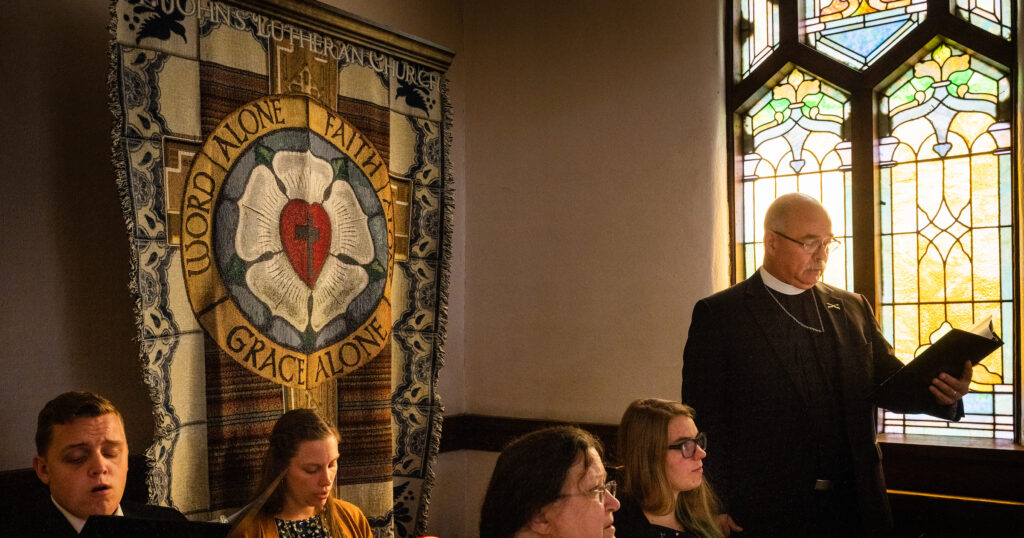The October 2025 issue of The Lutheran Witness provided definitions and explanations of nine different words we use often as Lutherans — and unpacked how other denominations use those terms differently. We are sharing several of these online throughout the month of October.
Definition:
Pastoral ministry is the office of preaching the Gospel and administering the Sacraments instituted by Christ for the forgiveness of sins.
Lutherans Confess:
The core responsibility and purpose of the Office of the Holy Ministry, or pastoral ministry, is to preach the Gospel and administer the Sacraments. Through Word and Sacrament ministry — as God’s Word is proclaimed and His gifts of Baptism and the Lord’s Supper given — the Holy Spirit works faith (AC V). Paul makes it clear why pastors are necessary: “And how are they to believe in Him of whom they have never heard? And how are they to hear without someone preaching? And how are they to preach unless they are sent?” (Rom. 10:14–15).
Pastoral ministry is an office, meaning that preaching and the administration of the Sacraments should only be publicly exercised by those who are called to it (AC XIV). How is this office conferred? (Or in Paul’s words, how are pastors sent?) The office is conferred by Christ, through the church (AC XIV). St. Peter also exhorts pastors to “shepherd the flock of God that is among you, exercising oversight” (1 Peter 5:2). Pastors are shepherds and overseers, and with administering the Sacraments comes the additional responsibility of oversight — excommunication and absolution (AC XXVII 21; Tr 60; John 20:22–23). Lutherans teach that, on behalf of the church, called pastors publicly exercise the Office of the Keys, “that special authority which Christ has given to His church on earth to forgive the sins of repentant sinners, but to withhold forgiveness from the unrepentant as long as they do not repent” (SC, The Office of the Keys, Explanation).
Unpacking Other Definitions:
- Indelible character: The Roman Catholic Church teaches that ordination is a sacrament, given by a bishop who has “apostolic succession” — in other words, they believe that the authority the bishop confers on the priest comes from an unbroken line that extends back to the authority Christ gave His apostles. When a priest is ordained, they teach, his soul is marked with an indelible character that distinguishes him as someone who acts in the person of Christ and as His instrument. For Roman Catholics, the efficacy of Word and Sacraments comes through the priest’s indelible character, as received through ordination and apostolic succession, rather than through the command, institution and words of Christ.
- Gifting of the Spirit: For Baptists and other low church traditions, the authority to preach and administer the Sacraments is not intrinsically tied to pastoral ministry; rather, it is the prerogative of the congregation. Furthermore, the “spiritual gift” of preaching and teaching can be given to anyone, regardless of qualification. With this approach, the authority to preach, teach and administer the Sacraments can become very individualistic (and can also erode one’s definition of the church — see p. 21). Lutherans instead emphasize that pastoral ministry is a public office, especially so that it is clear that the pastor, who is called by the church, is doing ministry according to Christ’s words and at His command.
- Women’s ordination: Churches that practice women’s ordination reject the qualifications for the pastoral ministry that are outlined in Scripture (1 Cor. 14:34; 1 Tim. 2:12). Proponents of women’s ordination often point to Phoebe (who was commended by Paul in Rom. 16:1) to justify the practice of ordaining women. However, there is no evidence that Paul’s reference to Phoebe as a servant meant that she performed Word and Sacrament ministry. Similarly, when Paul says “there is no male and female” in Galatians 3:28, he is not talking about pastoral ministry — he is talking about how all Christians are justified by faith and are now one in Christ.
From Scripture:
“Pay careful attention to yourselves and to all the flock, in which the Holy Spirit has made you overseers, to care for the church of God, which He obtained with His own blood” (Acts 20:28).
From Our Confessions:
“So that we may obtain this faith, the ministry of teaching the Gospel and administering the Sacraments was instituted. … Our churches teach that no one should publicly teach in the Church, or administer the Sacraments, without a rightly ordered call” (AC V 1; XIV).





